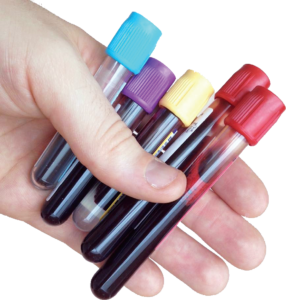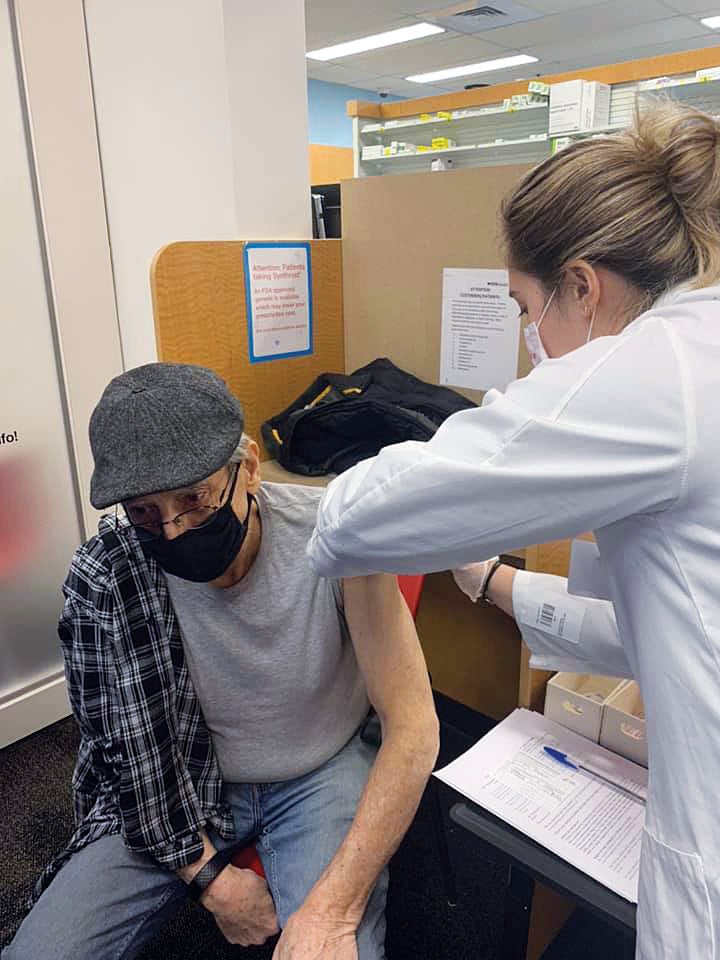Love for URI’s Library Education Program
This past weekend, a granddaughter of one of my cousins asked me about my library career for a class that she is taking involving career planning. When I responded, I referred her to a video that Assumption University (formerly Assumption College) posted this summer. It includes an interview that an employee of the alumni fund office conducted with me in late May. The interview details what my library career has meant to me. The former Graduate Library School at URI played a vital role in launching the wonderful career that I have enjoyed for more than 40 years. If anyone wishes to see it, the video is available here. Thank you so much for everything.
—Larry Spongberg, M.L.S. ’74
Larry Spongberg, aka Larry the Librarian, recently retired after 40 years as a librarian at Assumption University in Worcester, Massachusetts.
Ditching Syringes

I just read the article about plastics (fall 2020). I am a small animal veterinarian in Beverly, Mass. We have switched over to vacutainer use for 90 percent of our blood sampling. This saves so many syringes as well as plastic cases for them. I teach this to anyone that comes through my practice as a student intern, but it is still not widespread at all throughout the field.
—Nancy Crowley ’88
Thank God for Liberals
This (excerpted) note was in response to another reader’s note in the fall 2020 issue of the magazine:
( … ) Thank God for political liberals, who still have some ability to care about and empathize with the plights of others. The liberal philosophy of life and education that broadens students’ awareness of the commonalities and needs of humanity needs be enabled to flourish for the benefit of the entire human community. America is not Amerika, nor is it Stepford.
—Cheryl A. Madden ’02
Field Trips
I just finished Stephen Hopkins’ hilarious piece, “Field Ornithology and My Life of Crime,” in the fall 2020 issue. Fortunately, other URI students in the early 1970s had much more positive experiences at the Savannah River Ecology Lab (SREL), which, as I recall, was operated by the University of Georgia. Professors Stan Cobb and Bob Shoop made multiple field trips to the SREL with undergrad and grad students. Much of the terrain and water available for study was in the 310-square-mile property of the U.S. Atomic Energy Commission (AEC), and nuclear materials for bombs were pro- duced in the reactors onsite. Thus, access to the facility was not a given, leading to the attendant “nature sanctuary” feel of the place.
On both of my experiences there, we studied PAR Pond (actually a reservoir), which was part of the cooling waterways for the P and R reactors prior to water release to the Savannah River proper. One of my fellow grad students, Torgny Vigerstad, M.S. ’74, Ph.D. ’80, actually did his dissertation research in PAR Pond. In December 1971, as we checked in at the AEC administration building to pick up our badges for the field trip led by Professor Cobb, many short-haired government employees came out of their offices to behold a couple of the long-haired guys in our group—but I don’t think they ever suspected us of bank robbery.
—Dave Bengtson, M.S. ’74, Ph.D. ’82 Professor Emeritus, URI Department of Fisheries, Animal and Veterinary Sciences
Keeper of Her Culture
Wow, what a great article (“Keeper of Her Culture,” fall 2020) about a real life story. When I was at URI in the early 1960s, I worked for a lady at the Student Union who was from Kenyon. I remember her telling me about Usquepaugh and other Native American areas. After I got out of the Navy in 1966, I worked for two years at the Great Swamp Wildlife Management area in West Kingston. Coming originally from Bristol, I was interested in King Philip and the tragic war. This article brought back these memories, but sadly I learned how little I know of this culture. Thanks for the work of URI and Leah Hopkins ’20.
—Matthew Perry ’63
Civil Rights Activism at URI
The latest issue of URI Magazine suggested that civil rights activism at URI started in 1966. In fact, there was significant activity prior to that, including organizing for voter registration bus rides to the South and sit-ins at the capitol building in Providence for fair housing. Not to mention demonstrations in Wakefield because barber shops would not cut the hair of the African exchange students, read that Black. There was a small but active NSM (Northern Student Movement) group on campus, which morphed into a small but vocal SDS (Students for a Democratic Society) group (SDS represented something quite different at that time). URI should be aware of and proud of this history. In reading the article, it would seem that those earlier efforts were not as lasting as one could hope, but they were very real and should be remembered.
—Nada Chandler ’64
Scout Team
I was reading through your recent article about club sports (my roommate was on the sailing team) and loved the article (summer 2020). I regularly read the magazine and love the work you guys put in. I wanted to draw attention to a program I was involved in all four years of my collegiate years at URI. I was a scout team basketball practice player for the women’s basketball program.
Most Division I programs use men to practice against—like UConn, Duke, and BC. We wake up early, practice, get hurt, study plays, and follow other teams so we can better play and prepare our athletes for showtime. Not sure if an article has been written, but I wanted to bring some attention to those dedicated players and the role they play in helping the college athletes prepare for success in the game. Go Rhody!
—Rick Branca ’14
From the Editor
Thank you for the many, many comments and letters you shared in response to the last issue. Your feedback matters, not just to us (although it does make our day to hear from you), but to other readers, because it tells us which stories mean the most to you.
Speaking of which, the number of stories out there of URI folks and their incredible lives, work, creativity, and resilience is truly astounding. We can share only a tiny fraction in these pages, but we hope you find something here that inspires you in some way.
One that you might find inspiring—I did—is the short story below of a shared moment around a COVID vaccine. It shows how interconnected we all truly are—an important thing to remember in these days when, for so many of us, human connection is a rare and precious thing.
— Barbara Caron, Editor-in-Chief
Social Snap

In February, Clinical Professor of Pharmacy Practice Erica Estus ’96, Pharm.D. ’00, posted to social media: “Happiness is spending a Friday night with my dad (retired pharmacist Ronald DiMatteo) getting his first COVID vaccine. Bonus that he was vaccinated by a URI pharmacy student who took my geriatric pharmacy elective course this past fall. A 75-year-old retired pharmacist and a 22-year-old future pharmacist with a whole lot of stories to share—and a special Queens, N.Y., connection.”
Lauren Eng, Pharm.D. ’22, received her certification to immunize through the URI Pharm.D. curriculum and works as an intern at CVS Caremark. She loves administering vaccines. “So many people,” she says, “have said things to me like, ‘Once I am fully vaccinated, I can’t wait to be reunited with my children and grandchildren!’ It is amazing knowing that I am helping to bring the world back to ‘normal’—one vaccine at a time.”
“It is amazing knowing that I am helping to bring the world back to ‘normal’—one vaccine at a time.”
—Lauren Eng, Pharm.D. ’22
DiMatteo was Eng’s last vaccination of the day, so they had time to chat. “I’m from Astoria, Queens—born and raised,” says Eng, “and Mr. DiMatteo went to St. John’s University for pharmacy, which is right near my high school. I loved meeting him in person (we met him on Zoom last semester when I took Dr. Estus’ geriatrics elective and he was so sweet!) and hearing about his time in Vietnam and hilarious pharmacy school stories.” •
Write to us: urimag@uri.edu
